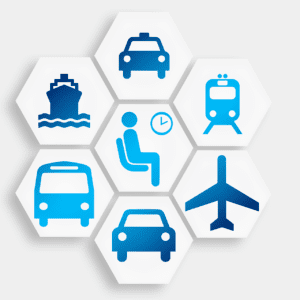Digital technologies open opportunities beyond optimising the way you offer your core products to existing and new customers. A more fundamental innovation is transforming the business world: a shift from sectors to ecosystems.
An example: a general insurance company may offer risk-based products that offer to cover consumers’ costs should certain events take place. The products apply to a variety of customer possessions: their car and their home, as well some of their activities such as leisure travel. Innovation is typically aimed at improving profitability and finding new ways to distribute products. This is the traditional sector view of the world, and the economy is organised around the activities of enterprises.
From sectors to ecosystems through business model innovation
Ecosystems are a fundamentally new way to understand a business’ purpose: serve the needs and activity of the customer. An ecosystem player will take a much broader view of the customers’ needs, and aim to provide a complete set of products and services to cover the entire set of needs of the customer in one or more fundamental human or organisational needs, using a combination of first-party and third-party products and services. Innovation in an ecosystem organisation is all about finding ways to more completely serve customer needs, through product development, partnerships and business model innovation. An ecosystem economy is organised around the needs of consumers and businesses.
Another example: as a consumer, my fundamental need is not to acquire insurance, it is to have a home. Taking this view, an organisation may provide me with a housing product, which includes the use of a home (rent/mortgage), utility and comfort (appliances, devices, energy, water), peace of mind (insurance, maintenance, emergency cover) and maybe even related services around food, entertainment and transportation.
Ecosystems are not just partnerships
Organisations have been exploring bundling for years, in order to provide a more complete set of products and services to their customers and grow revenues. Ecosystems could be seen as an evolution of this, but they go beyond: they require completely repositioning the organisation, a significant commitment to transformation, business model innovation as the core competence and a substantially different contract between the organisation and its customers.
Apple used to sell computers via third-party stores, collaborating with some developers in order to ensure that software was available for customers to run on their Macs and could be purchased in the same stores that sold those computers. Other developers created their software independently and competed in the open market. Apple used to be in the computer sector.
Fast forward to 2018: Apple sells devices in their own stores, and both software and media are only available through digital Apple stores preinstalled in every device. The nature of the partnership between Apple and developers is radically different: developers must enrol in the Apple Developer Programme, use Apple tools to develop this software, submit their work to Apple for review, sell their products at a price determined by Apple and pay Apple a commission for every sale. Consumers, meanwhile, benefit from very high-quality products and software, a great user experience, a convenient and trusted payment system and devices and apps that have been designed around their needs. Apple is now an ecosystem company.
Ecosystems: a brave new world
An ecosystems world appears to contain great promise: your customers will come to you more frequently, for more products, and be more satisfied. This is certainly true for some. However, a Digital world means geography and scale are no limit and winners take all. In such a world, what are the limits? The number of possible ecosystems is an important one. Consumers have needs around the areas of:
Taken literally, this list of 8 suggests that perhaps we’re heading to a future where 8-12 global organisations may monopolise the consumer space, with every other player relegated to participating in these ecosystems as unbranded suppliers, with no direct access to customers and few opportunities to differentiate or expand.
Innovation is the way to ecosystem success
Innovation is key to claiming your organisation’s place in the new ecosystem economy. What are your customers’ needs? How does your current offering help them serve those needs? What else could you provide to increasingly serve all of their need? How can you do this better, faster and providing more value? How do you all of this at a global scale?
These are the questions that a world-class innovation capability is set up to explore. Are you ready to claim success in the ecosystem economy? Let’s get started!



Leave a Reply